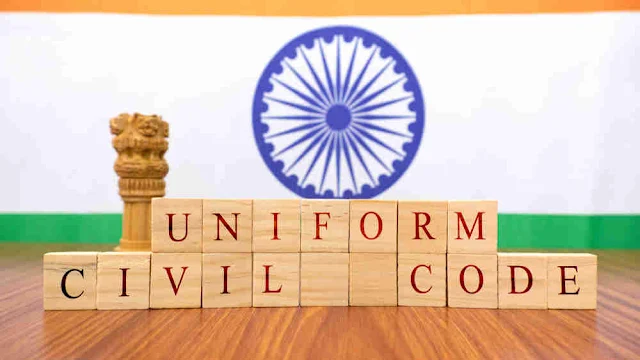 |
| IMAGE SOURCE: telegraphindia.com |
Introduction
Uniform Civil Code: Balancing Secularism and Tradition in India
What is the Uniform Civil Code?
A Uniform Civil Code means one law for all citizens, regardless of their religion, in matters of marriage, divorce, adoption, and inheritance. Currently, personal laws in India differ for various religious communities: Hindus, Muslims, Christians, Parsis, and others follow their own religious laws.
Hindu Law: Governed by the Hindu Marriage Act and Hindu Succession Act, covering Hindus, Buddhists, Jains, and Sikhs.
Muslim Law: Guided by Sharia, with unique provisions on marriage, divorce (like Triple Talaq), and inheritance.
Christian Law: Governed by Christian Marriage Act, with its own set of rules on civil matters.
The Secular Argument: Why Advocates Push for UCC
Proponents of the UCC argue that a common civil code is essential for creating a truly secular state. Under the current system, different laws for different religious communities violate the principle of equality before the law.
Gender Equality: Many argue that personal laws, particularly those governing Muslims, discriminate against women. For instance, the practice of Triple Talaq (now banned) and unequal inheritance rights for women under Islamic law are seen as archaic and unjust.
National Unity: Supporters also argue that the UCC would help unify India by eliminating legal distinctions between communities. A uniform law would contribute to a stronger sense of national identity and reduce religious divides.
The Traditional Argument: Why Critics Oppose UCC
On the other hand, critics argue that imposing a UCC would infringe on religious freedom and undermine India’s commitment to pluralism. India’s constitution protects the right of every citizen to follow their personal religious laws, and many see the UCC as a threat to this principle.
Religious Freedom: Minority communities, particularly Muslims and Christians, have expressed concerns that a UCC would impose Hindu-majority norms on all citizens. They fear that their cultural practices and religious identity could be eroded.
Cultural Diversity: India’s strength lies in its diversity, and critics argue that the UCC would flatten this richness by imposing a one-size-fits-all law on communities with distinct practices and traditions.
Legal and Political Developments
The UCC has long been a contentious issue in Indian politics, with both the Supreme Court and Parliament playing key roles in shaping the debate.
Supreme Court Judgments: The court has made several rulings over the years calling for the implementation of the UCC, often pointing to the need for gender equality and secularism.
Political Promises: The ruling Bharatiya Janata Party (BJP) has made the UCC a part of its political platform, arguing that it is necessary to modernize India’s legal system. However, the issue remains politically sensitive, and no government has yet been able to pass the UCC into law.
The Way Forward: Can Secularism and Tradition Coexist?
The challenge with the UCC is finding a balance between the secular principles enshrined in India’s constitution and the country’s commitment to preserving religious and cultural diversity. Some have proposed a more gradual approach, allowing communities to opt into a common civil code voluntarily.
Opt-In System: One proposed solution is to allow communities to voluntarily adopt the UCC, which could then gradually become the norm as more people choose it over personal laws.
Gender Reforms Within Religious Laws: Another approach could be to reform personal laws from within, addressing issues like gender inequality without imposing a uniform law on all communities.
Conclusion
The debate over the Uniform Civil Code reflects India’s ongoing struggle to balance secularism with religious pluralism. While the UCC promises equality before the law, it also poses risks to the country’s cultural and religious diversity. Whether India can find a middle path that respects both secularism and tradition remains to be seen, but one thing is certain: the UCC debate is far from over.





No comments: